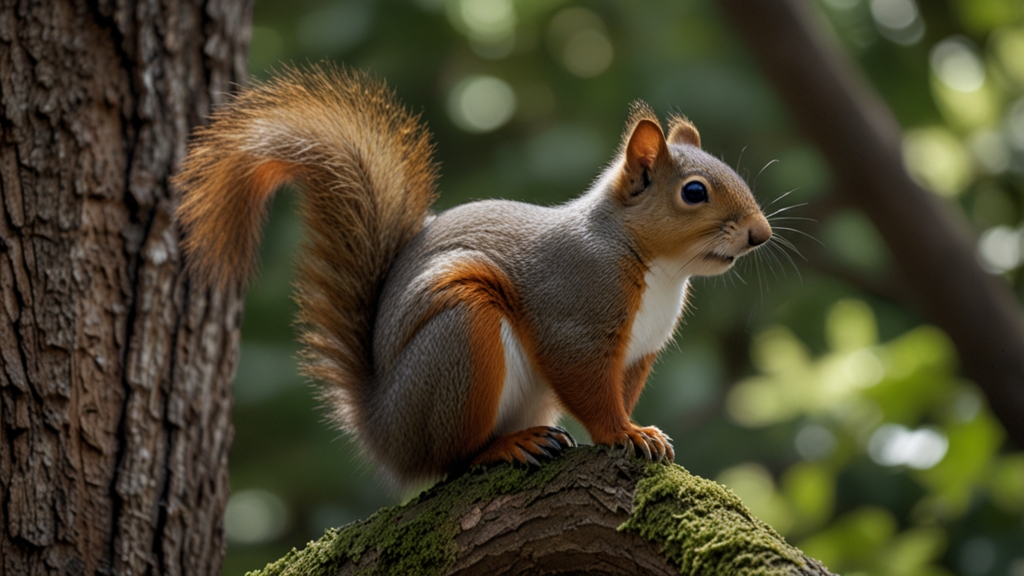
Squirrels are fascinating creatures in parks, forests, and urban environments. Known for their quick movements and distinctive bushy tails, squirrels are a natural part of many ecosystems. However, one question often arises: how long do squirrels live? This article will explore the lifespan of squirrels, the factors that affect their life expectancy, and compare their longevity in the wild versus in captivity.
Understanding the Lifespan of Squirrels
So, how lengthy do squirrels stay within the wild? On average, squirrels in the wild live anywhere from 6 to 12 years. However, it’s important to note that very few squirrels make it to this age due to the numerous dangers they face. Whether in a forest or an urban area, these creatures are constantly confronted by predators, accidents, and environmental factors.
How Long Do Squirrels Live in Urban Environments?
In cities, squirrels might live slightly longer than their wild counterparts. A more controlled environment and a steady food supply can contribute to a longer lifespan. Despite this, urban squirrels still face threats such as traffic accidents and predators like domestic pets. Therefore, how long squirrels live in the city depends on their access to resources and ability to avoid these hazards.
Different Species and Their Lifespan
The lifespan of squirrels can vary based on species. For example, tree squirrels typically live between 6 to 12 years in the wild, though many die before adulthood. However, the time squirrels live can differ depending on the species. Ground squirrels, often exposed to more predators, typically have a shorter lifespan, living only 1 to 3 years.
Flying squirrels, being nocturnal and smaller in size, have an average lifespan of about 3 to 5 years in the wild. These variations are influenced by habitat, food Availability, and the threat of predation, which all contribute to answering the question of how long squirrels live.
The Role of Predators in Squirrel Lifespan
Predators play a significant role in determining how long do squirrels live. Predators such as hawks, owls, snakes, and even domestic cats and dogs constantly threaten squirrels. As a result, many squirrels don’t survive to adulthood. Many young squirrels fall prey to these predators, drastically reducing their lifespan in the wild. Therefore, how long squirrels live is often impacted by the number and type of predators in their area.
Other Dangers to Squirrel Lifespan
Beyond predators, several other dangers can affect how long do squirrels live. For instance, traffic accidents are a leading cause of death for urban squirrels. They often run across roads, risking fatal collisions with vehicles. In rural and suburban areas, squirrels can also face harsh weather conditions that severely impact their survival rate.
Diseases and parasites also affect squirrels. Rabies, though rare, can be fatal. Additionally, fleas, ticks, and other parasites can weaken squirrels, making them more vulnerable to other illnesses and reducing their life expectancy.
How Long Do Squirrels Live in Captivity?
Regarding how long squirrels live in captivity, they tend to live much longer than in the wild. With proper care, squirrels can live up to 10 years or more in captivity. This is because they are protected from predators, have access to a steady food supply, and receive medical care. However, keeping squirrels as pets is not easy. They require specialized care, and many people who attempt to care for them struggle to meet their needs.
Factors That Affect How Long Squirrels Live
Several factors influence how long squirrels live, including genetics, diet, environment, and human intervention.
- Genetics – Squirrels with better genetic health will likely have a longer lifespan. Some squirrels are naturally more resilient to diseases and environmental stress.
- Diet – A proper diet is crucial to determine how long squirrels live. Squirrels in the wild eat various nuts, seeds, fruits, and insects, which provide essential nutrients to keep them healthy.
- Environment – The environment in which squirrels live significantly impacts how long do squirrels live. Urban squirrels often have access to food sources like bird feeders, which extend their lifespans. However, this is not always the case in rural areas, where they may have fewer resources.
- Human Intervention – In cases where humans intervene by providing food, shelter, or medical care, squirrels can live longer. Wildlife rehabilitation centers often increase a squirrel’s life expectancy, protecting it from predators and diseases.
Common Health Issues that Affect Squirrel Lifespan
Squirrels are prone to several health problems that influence how long they live. Some of the most common issues include:
- Rabies: Though rare, squirrels can get rabies. This viral infection can lead to death if not treated promptly.
- Parasites: Fleas, ticks, and other parasites weaken squirrels, making them more vulnerable to illness and infection, shortening their lifespan.
- Malnutrition: Squirrels that cannot find enough food may suffer from malnutrition, which can significantly impact their health and reduce how long do squirrels live.
- Broken Bones: Squirrels are agile and often leap from tree to tree, but falls and injuries can result in broken bones. If not treated, these injuries may lead to early death.
How Long Do Squirrels Live in Zoos and Wildlife Reserves?
In controlled environments like zoos and wildlife reserves, squirrels are typically well cared for, leading to longer lifespans. The absence of predators and access to a controlled diet can significantly extend how long squirrels live in these settings. With the right environment, squirrels can live in captivity for up to 10 years or more, far surpassing their wild counterparts.
The Impact of Squirrel Lifespan on Ecosystems
Squirrels play a vital role in ecosystems, especially in forests. They help to disperse seeds, which contributes to forest growth. Understanding how long squirrels live and their role in their environments can aid conservation efforts. Longer-living squirrels may help maintain ecosystems as they continue to plant seeds and contribute to forest regeneration.
How Can We Help Squirrels Live Longer?
So, how long do squirrels live, and what can we do to help them live longer? There are several actions we can take to improve the chances of squirrels surviving and thriving:
- Provide food during harsh weather: Squirrels often struggle to find enough when food is scarce. Offering birdseed or nuts during the winter months can help.
- Create safe spaces: If you have a garden or backyard, create spaces for squirrels to hide from predators. A few bushes or trees can provide cover and give squirrels a resting place.
- Avoid harming squirrels: Squirrels face enough dangers without human interference. If you encounter a squirrel, avoid scaring or injuring it, and don’t try to capture or harm it.
- Educate others: Sharing knowledge about how long do squirrels live and the challenges they face can help others protect these animals as well.
Conclusion
how long do squirrels live? In the wild, squirrels live between 6 to 12 years, although many face dangers that shorten their lives, such as predation, disease, and accidents. In captivity, squirrels can live up to 10 years or more with proper care and protection. The factors influencing a squirrel’s lifespan are varied, including its diet, environment, and genetic health. By understanding how long do squirrels live and taking steps to protect them, we can ensure these fascinating creatures thrive in both the wild and in urban environments.







